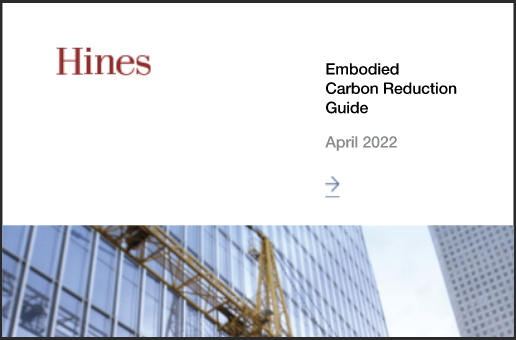Real estate management and investment firm Hines has released the Hines Embodied Carbon Reduction Guide.
The free guide, produced with Magnusson Klemencic Associates (MKA), is the result of a two-year effort, relying on MKA’s industry-leading knowledge of carbon accounting and involvement in programs such as the Embodied Carbon in Construction Calculator (EC3) Tool, according to a news release.
The “108-page program aims to create more sustainable development practices at Hines while establishing an industry standard for quantifying, tracking, and reducing embodied carbon in the commercial real estate development process,” the release says.
“By sharing the Embodied Carbon Reduction Guide with developers, engineers, contractors, material suppliers, investors, and other industry partners, Hines and MKA aim to affect lasting, responsible, and sustainable progress toward reducing the built environment’s carbon footprint,” the release says.
In a related developed, Hines says that its Salesforce Tower Chicago project, a 60-story, 1.2 million-sf office tower recently topped out. The firm says it is the first building to achieve a 19% overall reduction in carbon emissions by using the guide. Nineteen percent equates to a total verifiable structure carbon savings of over 7 million kilograms of C02, which equates to taking more than 1,500 cars off of the road for a year.
Related Stories
| Mar 22, 2012
Bill would reintroduce “opt-out” provision in lead paint law
The Lead Exposure Reduction Amendments Act of 2012 (S2148) would restore the "Opt-Out" provision removed from the Environmental Protection Agency's Lead Renovate, Repair and Painting (LRRP) rule in April 2010.
| Mar 15, 2012
New Florida building code establishes flood and storm surge provisions
The new 2010 code establishes minimum design and construction requirements to protect buildings from wind, rain, floods, and storm surges.
| Mar 15, 2012
Illinois city rejects international code due to home sprinkler requirement
Macomb, Illinois aldermen voted to recommend that the city not adopt 2012 international building and residential code standards requiring the installation of overhead sprinkler systems in newly constructed one-family and two-family homes.
| Mar 15, 2012
Tenant advocates propose licensing landlords in New York City
With thousands of New York City rental units posing potential dangers to tenants, city advocates are proposing measures to make landlords improve building safety.
| Mar 15, 2012
Construction industry a big winner in federal small disadvantaged business procurement
Last year, only 5% of federal contract dollars went to small disadvantaged businesses. Construction and facilities support firms were the biggest beneficiaries.
| Mar 15, 2012
ANSI approves new fall protection standards
The American National Standards Institute (ANSI) has approved two American Society of Safety Engineers' (ASSE) standards addressing fall protection.
| Mar 8, 2012
Engineering innovation provides new option for meeting seismic codes in skyscrapers
Two University of Toronto engineers have developed “viscoelastic-energy-dissipating dampers” to replace many of the heavy concrete beams used in tall structures.
| Mar 8, 2012
CSI webinar on building code compliance March 22
A March 22 webinar will provide an overview of a 28-step process during the design of a building to ensure compliance with building codes.















